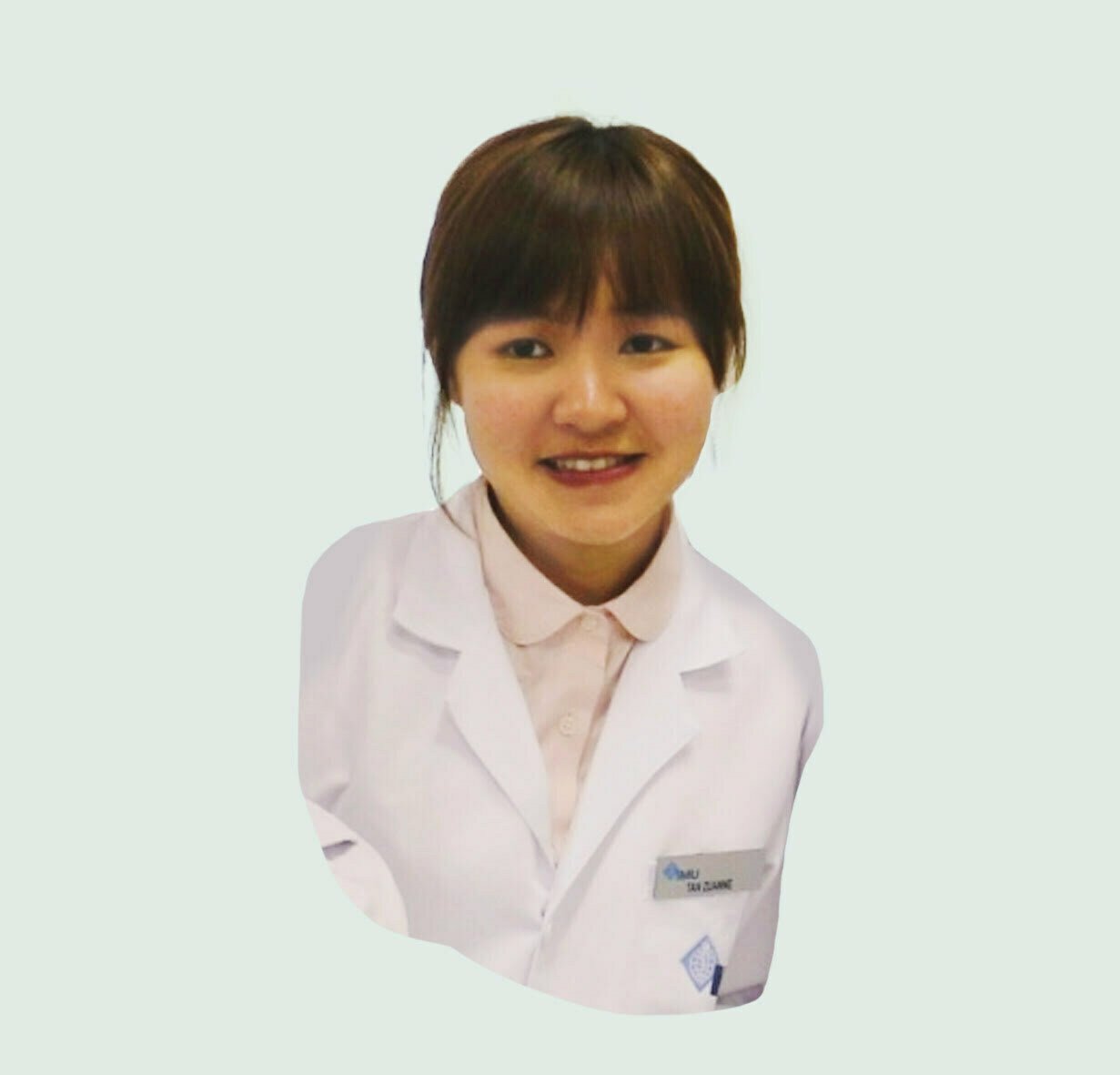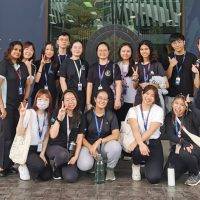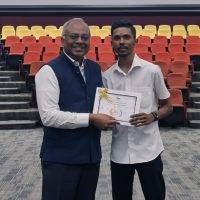ABOUT
Nutrition is the science that deals with the study of foods and nutrients, and their effect on an individual from an environmental, socio-cultural, psychological and behavioural perspective. Nutrition also addresses consumer concerns on food and water safety, food quality and regulations.

Nutrition Degree
The Nutrition programme from IMU equips students to pursue careers in various fields including industry, education, health promotion, research and journalism.
The curriculum accords strong emphasis not only on core nutrition modules, but also on key profession-supporting modules such as:
IMU’s Nutrition programme provides students with a rigorous experience in research methodology and application for each stage of the research process and data management. Students will have the opportunity to showcase their completed research in scientific conferences and journals.
Key Facts
Why Study Nutrition at IMU?
An Established Private Healthcare University
IMU is Malaysia’s first and most established private medical and healthcare university with over 30 years of dedicated focus in healthcare education.
IMU achieved the SETARA-2018/2019 Tier 6 status (Outstanding) under the Mature University category.
Build Your Future Healthcare Professional Network
As IMU offers the widest range of healthcare programmes, our students are fully immersed in a vibrant community of students and practitioners from all healthcare fields.
This allows for the development of strong friendships amongst peers that will be the foundation of an extensive healthcare professional network upon graduation.
Well-Known Faculty Members
The lecturers in the Division of Nutrition and Dietetics are recipients of research grants, high impact publications and key opinion leaders in the fi eld of nutrition and dietetics.
Training Future Leaders
Our curriculum provides opportunity to develop leadership and team working skills due to strong emphasis on Interprofessional learning and group projects.
The courses place great emphasis on building good communication skills through various oral presentation, case study discussions, training with simulated and real life patients.
Opportunity for Work Life Experience and Student Mobility
The innovative curriculum offers early exposure to work experience and hands on opportunity to enhance skills through clinical and community projects.
There are also opportunities for student mobility programmes in clinical and community setting which improves work preparedness of the graduates.
Programme Structure
Semester Contents
| Short Semester | Semester 1 | Semester 2 |
|---|---|---|
|
|
|
| Semester 3 | Semester 4 | Short Semester 1 |
|---|---|---|
|
|
|
| Semester 5 | Short Semester 2 | Semester 6 |
|---|---|---|
|
|
|
Entry Requirement
| Examinations | Requirements |
|---|---|
| A- Levels | CDD (Including 2 subjects from: Biology; and/or Chemistry; and/or Physics / Mathematics) |
| STPM | Overall cGPA 2.50 (cGPA 2.33 In 2 subjects from: Biology; and/or Chemistry; and/or Physics / Mathematics) |
| Australian Matriculation | ATAR 70 (Including 2 subjects from: Biology; and/or Chemistry; and/or Physics / Mathematics) |
| NCEA Level 3 | 65% aggregate (with 60% in 2 subjects from Biology; and/or Chemistry; and/or Physics / Mathematics) |
| Canadian Grade 12/13 | 70% aggregate in 6 subjects (with an average of 60% in 2 subjects from: Biology; and/or Chemistry; and/or Physics / Mathematics) |
| Unified Examination Certificate (UEC) | B in 5 subjects (Including 2 subjects from: Biology; and/or Chemistry; and/or Physics / Mathematics) |
| Australian University Foundation Programmes | 70% aggregate or ATAR 70 (with 60% in 2 subjects from Biology; and/or Chemistry; and/or Physics / Mathematics) |
| Indian Pre-University | 65% aggregate (minimum 60% in 2 subjects from Biology; and/or Chemistry; and/or Physics / Mathematics) |
| Ministry of Education Matriculation # | Overall cGPA 2.50 (cGPA 2.33 In 2 subjects from: Biology; and/or Chemistry; and/or Physics / Mathematics) |
| International Baccalaureate (IB) | 26 points (Including 2 subjects from: Biology; and/or Chemistry; and/or Physics / Mathematics) |
| American High School Diploma with Advanced Placement (AP) | Overall cGPA 2.50 (cGPA 2.33 in 2 subjects from Biology; and/or Chemistry; and/or Physics / Mathematics) |
| Foundation Studies # | Overall cGPA 2.50 (cGPA 2.33 In 2 subjects from: Biology; and/or Chemistry; and/ or Physics / Mathematics) (Foundation in Science / Foundation in Biosciences / Foundation in Engineering or equivalent) |
| Degree | BSc in related field: cGPA 2.00 |
| Diploma | Diploma in Science (including 2 science subjects) ; Diploma in related field – cGPA 2.75 Diploma in related field with a cGPA less than 2.75 and minimum 3 years of working experience in the same field |
# The duration of this programme must be a minimum of 1 year in the same accredited institution and foundation in other disciplines are accepted.
English Language Requirement
| MUET* | Band score of 3; or (For Malaysian students) |
| IELTS | Overall band score of 5.5; or |
| TOEFL iBT* | Overall score of 46; or |
| Cambridge English : Advanced (CAE)* | Overall score of 162; or |
| Cambridge English : Proficiency (CPE)* | Overall score of 162; or |
| Cambridge Linguaskill* | Overall score of 160; or |
| Pearson Test of English (PTE)* | Overall score of 51; or |
| Credit Transfer | IELTS Overall band score of 7.0 |
The following categories of students* are exempted from the English requirements:
Students who graduated from other institutions where the curriculum is delivered in English Language for example: Advanced Levels / Australian Matriculation / Australian University Foundation Year / Canadian Matriculation / International Baccalaureate / Foundation in Science / Other Pre-University/ Programmes from Local Higher Education Institutions
* ONLY applicable for those who are completing the entire degree at IMU, Malaysia
Note
Please note that achieving the minimum Entry and English requirements as stated does not guarantee you admission into any of IMU’s programmes.
Please refer to our Student Admissions Policy for more information.
Application and Registration Fees
| Fee | Malaysian Student (RM) | International Student (RM) |
|---|---|---|
| Application Fee | 150 | 500 |
| Registration Fee | 850 | 2,000 |
| Refundable Caution Deposit | 1,000 | 1,000 |
Fee Structure
malaysian student
| Total Duration (years) | At IMU University | At Partner University (PU) | ||||||
|---|---|---|---|---|---|---|---|---|
| Years | Total Semesters | Tuition Fee (RM) | Estimated Tuition Fees at Partner University | |||||
| Per Semester | Per Year | Years | Semesters | Tuition Fee Per Year * | ||||
| Bachelor of Science (Hons) Nutrition | 3 | 3 | 6 | 22,300 | 44,600 | – | – | – |
| – Credit Transfer to Deakin University Bachelor of Nutrition Science |
3 | 2 | 4 | 22,300 | 44,600 | 1 | 2 | AUD40,200 |
International Student
| Total Duration (years) | At IMU University | At Partner University (PU) | ||||||
|---|---|---|---|---|---|---|---|---|
| Years | Total Semesters | Tuition Fee (RM) | Estimated Tuition Fees at Partner University | |||||
| Per Semester | Per Year | Years | Semesters | Tuition Fee Per Year * | ||||
| Bachelor of Science (Hons) Nutrition | 3 | 3 | 6 | 23,500 | 47,000 | – | – | – |
| – Credit Transfer to Deakin University Bachelor of Nutrition Science |
3 | 2 | 4 | 23,500 | 47,000 | 1 | 2 | AUD40,200 |
| Country | Estimated Living Costs (Per Year) |
Exchange Rate (As of Dec 2023) |
|
|---|---|---|---|
| Estimated Living Cost (Per Year) | Australia | AUD 21,000 – AUD 30,000 ≈ RM 65,900 – RM 94,200 | AUD 1 ≈ RM3.14 |
| Canada | CAD 28,000 ≈ RM 98,000 | CAD 1 ≈ RM3.50 | |
| China | RMB 85,000 ≈ RM 56,100 | RMB 1 ≈ RM0.66 | |
| Ireland | EUR 12,000 ≈ RM 62,000 | EUR 1 ≈ RM5.17 | |
| New Zealand | NZD 22,000 – NZD 26,000 ≈ RM 64,500 – RM 76,200 | NZD 1 ≈ RM2.93 | |
| United Kingdom | GBP 10,000 – 22,700 ≈ RM60,000 – RM 136,200 | GBP 1 ≈ RM6.00 | |
| United States of America | USD 16,000 ≈ RM 75,800 | USD 1 ≈ RM4.74 | |
| Kuala Lumpur, Malaysia | RM36,000 | RM36,000 |
Partner Universities
As an assurance of a total commitment towards quality education in nutrition, the IMU maintains its relationship with partner university in Australia and United Kingdom. Eligible graduates from IMU’s nutrition programme can enrol into King’s MSc in MedTech Innovation & Entrepreneurship at King’s College London, United Kingdom.
Australia
United Kingdom
Industrial Partners
The curriculum structure is constantly updated to meet the ever-changing industries’ needs and includes research-led teaching to deliver evidence-based knowledge and practice in the industry. Students will have the opportunity to undergo industrial training in the related sectors in their final semester. They will also be able to collaborate with industry or/and researcher in related project in their final year. The organisations involved in these internships are:
Views from Our Community

Sylvia Ho Jie Ying
Alumna, Nutrition
My journey with IMU is remarkable and one life-changing event! As IMU Nutrition students, we were blessed with enormous opportunities in community projects. I vividly remember my participation in the “First 1000 days” project where I took on the lead role in educating nutrition to mothers with young children. My biggest takeaways were involvement in Nutrition Society Malaysia (NSM) 2.0 roadshow activities and IMU-Deakins student mobility project. I am also grateful for my experience during practicum that enables me to showcase my leadership and project management skills. I would like to express my gratitude to my lecturers for their support and guidance, without them, I would not be who I am today, a courageous young Nutritionist who aims to take on new challenges.

Teo Chun Yi, Jennifer
Alumna, Nutrition
I am a person who is passionate about food, nutrition and living a healthy lifestyle. Joining the IMU Nutrition programme was the best decision I made! Over the 3 years of my studies, I enjoyed studying the programme, the student life, my co-curriculum activities and the food in IMU. We get to meet nutritionists from various industries and I appreciated the career exploration opportunities. This certainly helped me to build and develop my future goals and aspirations. I am very fortunate to be one of the Best Thesis winners in conjunction with the 34th Scientific Conference of Nutrition Society of Malaysia 2019.

Tan Zuanne
Alumna, Nutrition
A once in a lifetime experience does not come every day, so I jumped at the opportunity to attend the Winter Course 2019 with 57 students from different health professions and countries including, Indonesia, Taiwan, Timor Leste and Sweden. The course focused on interprofessional education through lectures, clinical observations and lab training. Along with the other Malaysians, we went with an open mind, not knowing what to expect, but little did we know that what was in store for us would be a memorable experience!” shared Zuanne, who had the opportunity to represent the programme to join the Winter Course 2019 organised by the University of Gadjah Mada, Yogyakarta, with the theme - Women’s Health and Wellness.

Lee Juen Jiat, Jake
Alumnus, Nutrition
The 3 years of studying in IMU flies so fast. IMU has prepared me well in term of the essential skills in nutrition education, nutrition communication development and project management. I have learnt the importance of working independently, being persistent, multitasking and at the same time be flexible. The IMU Nutrition curriculum is comprehensive and provided many opportunities to develop our soft skills. I truly enjoyed it.
Latest New & Stories
Research & Activities
Diet and nutrition play an important role in influencing our health. Hence, it is essential that research is conducted in the areas of nutrition and dietetics to further our knowledge in this field. This is one of the important roles of the Centre for Transformative Nutrition and Health (CTNH) in its bid to gain a reputation in food & clinical nutrition related areas.
What is CTNH?
 The Centre for Transformative Nutrition and Health (CTNH) aims to contribute and increase knowledge in the field of nutrition and health and train future nutritionists & dietitians. We are a team of researchers from various backgrounds, studying the nutrition-health relationship at various levels to understand the complex ways in which diet and nutrition influence our health.
The Centre for Transformative Nutrition and Health (CTNH) aims to contribute and increase knowledge in the field of nutrition and health and train future nutritionists & dietitians. We are a team of researchers from various backgrounds, studying the nutrition-health relationship at various levels to understand the complex ways in which diet and nutrition influence our health.
Frequently Asked Questions
What is the structure of the programme?
Semester contents are available in the programme brochure [Download Brochure]
What are the teaching/learning approaches used?
The nutrition programme utilises a combination of teaching and learning approaches, including lectures, tutorials, practical classes, computer-aided learning (CAL), e-learning portal, seminars, debates, problem-based learning, field visits, group and individual assignments and presentations in the community.
Who are the teaching staff?
The faculty comprises well-qualified lecturers with vast experiences in teaching, research, publications, working in partnership with the government and industry in Malaysia and internationally. Expert research areas of the faculty include maternal and child nutrition, micronutrients, dietary lipids and diet-disease relationships. The nutrition programme also receives teaching support from experienced staff in IMU with respect to teaching basic sciences and
other modules.
How will I be assessed?
Students will be assessed through class tests, end of semester examinations, practical work, reports, assignments, problem-based learning, projects, presentations, and thesis for the final year projects.
Are there any industry placement?
Students are required to undergo industrial placements scheduled in the 6th semester. Students will be attached to appropriate community level in collaboration with the industry partners, government, private associations, non-governmental organisations or related international agencies.
What are the semester contents?
Semester contents are available in the programme brochure [Download Brochure]
What is the medium of instruction?
The medium of instruction is English. Students who come from a system of education in which the medium of instruction is not English are strongly recommended to improve their proficiency in English by making their own arrangements to attend additional English Language classes before entering IMU.
Who will award the nutrition degree?
The Bachelor of Science (Hons) Nutrition degree is awarded by IMU.
What sort of jobs/careers can be undertaken with this degree?
In the past decade, the government of Malaysia has substantially expanded its nutrition programmes and number of nutritionists to address diet-related challenges in the country. Increasing public interests in nutrition and health-promoting products have led the food and related industries and businesses to create more job opportunities for nutritionists. Nutritionists are well–placed to be employed in different settings in Malaysia and internationally.
Community Nutrition
Nutritionists are employed by government agencies and private organisations for community nutrition activities. These include assessment of nutritional status; formulation and evaluation of nutrition programmes; development of training manuals and guidelines, conduct of nutrition education and health promotion, undertake surveys and research, and coordinating nutrition intervention activities. Community settings include schools, work places (e.g. offices and factories), orphanages and homes, as well as rural and urban populations of concern.
Industry and Businesses
There are diverse roles for nutritionists in the food industry, ranging from regulatory roles to ensure nutritional claims and product labelling are appropriate, to being involved in nutrition research for supporting new product claims. The food industry also engages nutritionists for marketing, advertising, advisory and communication roles.
The wellness industry in Malaysia is growing rapidly in tandem with the increase in people becoming more health conscious. The wellness business offers career opportunities for nutritionists in providing healthcare services and products to individuals and corporates. The fitness industry and sports nutrition industry are also fast growing in Malaysia, as increasingly more fitness clubs and exercise facilities are set up. Nutritionists have advisory roles in these businesses on matters related to body composition, weight management, energy and nutrient requirements, and dietary supplements.
University / Research Institutions
A career in an academic institution is for those interested in teaching, research, scientific writing, giving presentations and building capacity
in training future nutritionists. For those who wish to focus on research, they may explore working in research institutions in the public sector (e.g. Institute for Medical Research, Institute of Public Health), or the private sector (e.g. food and healthcare industry).
Consultancy
Nutritionists with sufficient experience can offer consultancy in nutrition services, education and advocacy to the corporate and government sectors, professional societies and the mass media. Freelance nutritionists may be engaged to offer nutrition screenings, education, and healthy lifestyle management to individuals and in group settings.
When do i apply for a place in IMU?
You can apply using forecast or actual results.
Have a Question? Ask Us
Interested in Applying for One of Our Programmes?
Having Issues with Your Online Application Process?
Need Assistance?
A Word from the Programme Director

DR SERENE TUNG EN HUI
Senior lecturer and Programme Director MAHPC (NUTR) 00311
PhD (Community Nutrition), MSc (Community Health), BSc (Hons) Biology (Universiti Putra Malaysia)
PGD (Tertiary Teaching) (UCSI University)
“Our Nutrition programme prepares students to meet the needs for nutritionists by government agencies, industry, universities, research institutions, mass media and businesses involved with food, nutrition, wellness, fitness and health”















